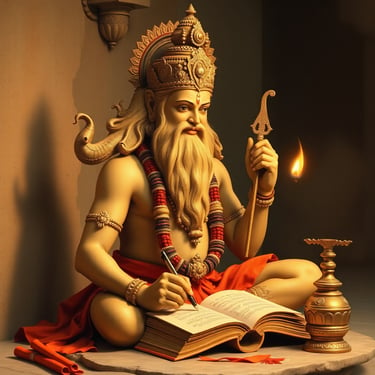What are the Vedas?TheVedicSite(c)2024


The Vedas are one of the oldest and most sacred texts in existence. They are a collection of ancient spiritual and philosophical teachings that have have been passed down for thousands of years, originally as an oral teaching.
For centuries the Vedas were passed down from generation to generation through oral recitation by a select group of priests known as Brahmins.
The word Veda is derived from the Sanskrit word "Vid" which means "knowledge". The Vedas are a vast collection of knowledge and wisdom consisting of four main texts: Rig Veda, Yajur Veda, Sama Veda and Atharva Veda. These texts are believed to have been composed between 1500 BCE and 1000 BCE by ancient sages known as rishis. The original rishis or sages that introduced The Vedas were said to be the seven Saptarishis who brought down to Earth the knowledge and energy needed to guide humans towards their spiritual evolution.
The Rig Veda is the oldest of the four Vedas and is considered to be the most important. It consists of 1028 hymns composed in Vedic Sanskrit and is dedicated to various deities such as Indra, Agni and Soma. The Rig Veda also contains hymns that praise the cosmic principles of creation, preservation and destruction.
The Yajur Veda is a collection of ritualistic texts that provide instructions for conducting various ceremonies and sacrifices. It is divided into two parts : the Krishna Yjur Veda and Shujkla Yajur Veda. The former is used for rituals involving sacrificial fire while the latter is used for rituals performed without fire.
The Sama Veda is a collection of melodies and chants that were originally derived from the Rig Veda. It is considered to be one of the oldest musical texts in the world and is still used in religious ceremonies today.
The Atharva Veda is a compilation of hymns, spells and incantations used for healing and protection. It also contains knowledge on various subjects such as astrology, medicine and philosophy.
Apart from these four main texts, the Vedas also include Brahmanas, Aranyakas and Upanishads. These texts provide further explanations and interpretations of the Vedas. The Vedas are often associated with Indian culture but the Vedas are a universal wisdom that goes beyond cultural and religious constructs. They are relevant for everyone who is born on this Earth.
The Vedas are considered to be Divinely revealed texts. The rishis received this knowledge from Divine through meditation and Divine inspiration. Avataric or Plenary incarnations throughout the ages help to restore Dharma and the wisdom of the Vedas. The principles of righteousness and dharma are derived from the Vedas.


